UK House Prices on Target for 15% Fall Despite Interest Rate Cuts
Housing-Market / UK Housing Feb 08, 2008 - 02:20 AM GMTBy: Nadeem_Walayat

 UK House prices fell by £4,000 (2.1%) in January 2008 (Halifax), the average price falling to £191,275, down £9,806 (4.8%) from the August 2007 peak of £201,081. The Market Oracle forecast as of August 2007 is for a fall in average house prices of 15% over two years to August 2009. UK interest rates were cut yesterday by a further 0.25% taking interest rates down by 0.5% from its peak of 5.75% (Forecast December 2006), the cuts to date and further anticipated cuts during 2008 are being mistakenly taken by many market commentators, economists and large mortgage banks such as the Halifax to imply that UK House price inflation will be neutral during 2008. Therefore this article illustrates why house price inflation will start going negative by April 2008.
UK House prices fell by £4,000 (2.1%) in January 2008 (Halifax), the average price falling to £191,275, down £9,806 (4.8%) from the August 2007 peak of £201,081. The Market Oracle forecast as of August 2007 is for a fall in average house prices of 15% over two years to August 2009. UK interest rates were cut yesterday by a further 0.25% taking interest rates down by 0.5% from its peak of 5.75% (Forecast December 2006), the cuts to date and further anticipated cuts during 2008 are being mistakenly taken by many market commentators, economists and large mortgage banks such as the Halifax to imply that UK House price inflation will be neutral during 2008. Therefore this article illustrates why house price inflation will start going negative by April 2008.
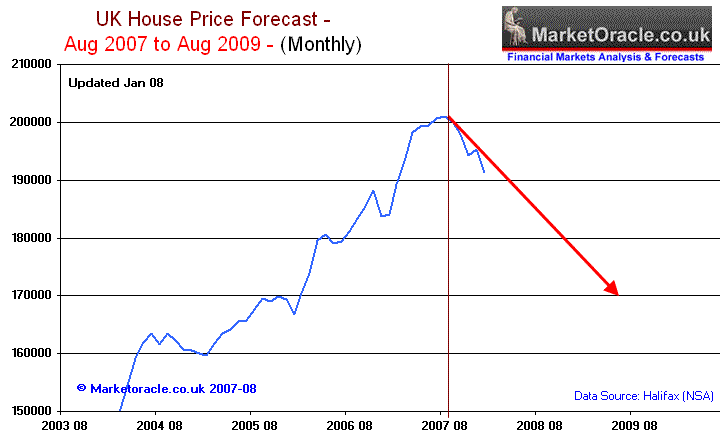
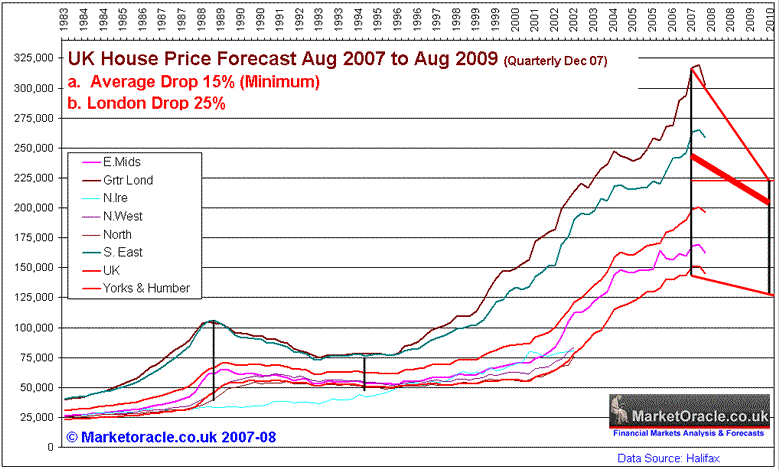
Why UK House Price Inflation will Go Negative Starting April 2008
The monthly average UK house prices graph, which is derived from data from Britain's biggest mortgage bank (the Halifax), clearly shows the peak in UK house prices in August 2007 at a price of 201,081. After which house prices have been in the process of tracking the two year forecast lower towards a target of £170,000 by August 2009 (15% drop). The decline to date has taken house prices down to £191,275 by January 2008. The November article explained that buy to let investors selling will ensure a further sharp deterioration in the UK housing market during the quarter April 2008 to June 2008. Therefore the immediate trend can be expected to continue lower during that quarter. Even if the rate of house price declines slow to a crawl from the present rate of £2000 per month to just £500, that would still suggest a further fall of £2000 by the release of the May 2008 statistics, which would equate to an average UK house price of £189,275. or a fall of £11,800 (6%) from the August 2007 peak.
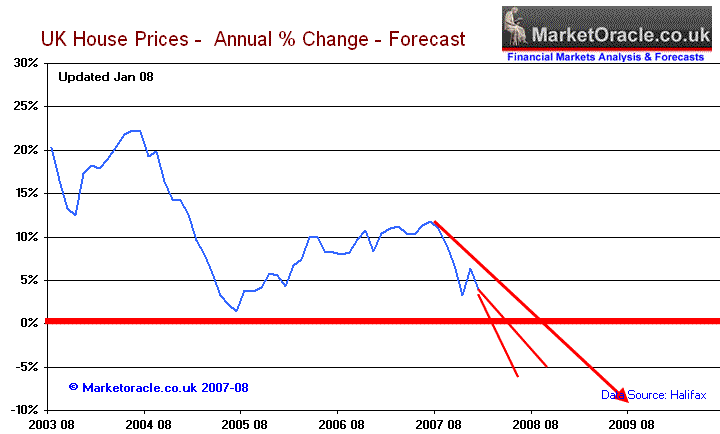
Presently UK annualised house prices inflation stands at 3.9% despite a fall in house prices of £9,800. However what many analysts fail to realise is that the house prices for the months of April through June 2007, i.e. last year, are significantly above the CURRENT average house price, therefore even if house prices do not fall, i.e. stabalise at £191,275, UK house prices will still go negative in April 2008, as the table below demonstrates.
| Annualised UK House Price Inflation 2008 | Stabalised house prices | House prices fall by £500 per month |
| March 2008 | 1.1% |
0.6% |
| April 2008 | -1% |
-1.8% |
| May 2008 | -3.5% |
-4.5% |
| June 2008 | -4% |
-5.3% |
| Dec 2008 | -1.5% |
-4.4% |
The actual trend expectation as per November 2007, is for a sharp drop in the quarter April to June 2008 due to the impact of the capital gains tax rule changes on the buy to let sector from April 08 onwards. Following which house prices may stabalise at lower levels for some months before the next series of declines takes place as the UK economy slows going into 2009. This trend would imply that the UK will end 2008 with a house price decline of about 9% from the August 2007 highs and at annualised house price deflation of as much as 7% during the summer, which would be expected to reduce to under 5% by the end of 2008.
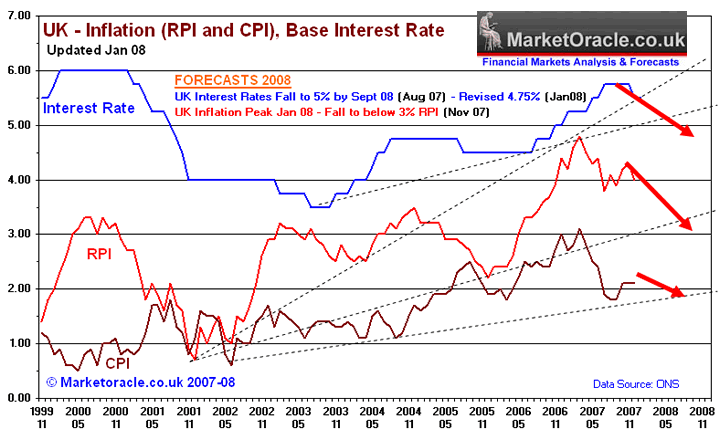
Just as rising house prices made UK home owners feel more wealthy, with equity withdrawals for consumption all the rage and many buying second properties as buy to let investments. First time buyers eager to jumping onto the housing ladder at multiples of X7 under lax lending regimes . Similarly house price declines are now having a far more deflationary effect on the the UK housing market and the UK consumer than the inflationary impact of cuts in UK interest rates. Even if UK interest rates are cut towards my forecasts for 2008 of 5% (Sept 07) revised to 4.75% (Jan 08). The effect of these cuts on mortgage interest payments would amount to an estimated reduction of £108 per month on an average mortgage of £130,000. This is if the mortgage lenders pass on all of the rate cuts, which as we have seen does not always happen. Against this, average house prices are presently falling at a much faster rate of £2000 per month. With the anticipated average rate of decline by September 2008 being estimated at £1200 per month, against an forecast interest rate of 4.75% resulting in a £108 monthly saving. Thus still completely negating any perceived positive impact of interest rate cuts and hence the housing bear market will increasingly impact the consumer and the UK economy going into 2009.
A further negative on the interest rate front, is the impact on the estimated 1.4 million home owners on low fixed rate mortgages taken out during the height of the housing boom, well before the credit crunch started to bite that will see their mortgages reset to much higher interest rates. Current fixed mortgage products carry much tighter lending criteria and therefore many mortgage resets will not be able to secure any of the more favorable interest rates and be stuck on high standard variable interest rates as cash starved banks attempt to replenish their reserves and make further allowances for bad debts.
Repossessions and Affordability
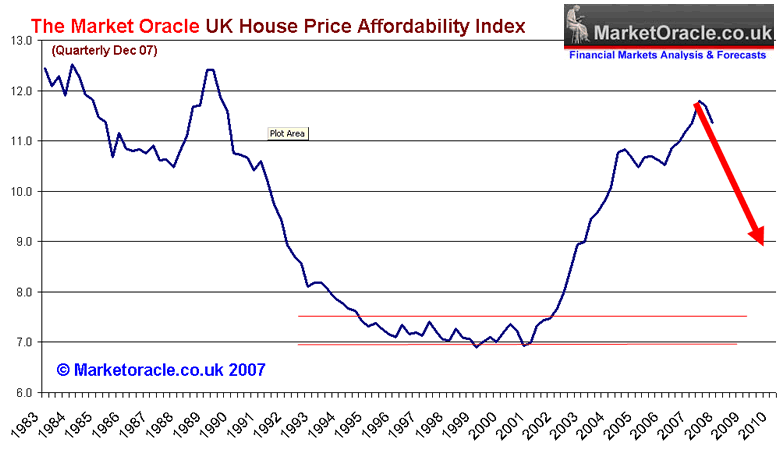
The UK housing market remains at historically high unaffordability levels as illustrated by the Market Oracle UK House Price Affordability Index. Affordability concerns will continue to come to the fore as the expectations of capital appreciation diminishes and the number of repossessions continues to escalate as record amounts of debt put households under increasing pressure. An estimated 30,000 properties were repossessed during 2007, up 33% on 2006 with 2008 at this point expected to increase by at least 50% to 45,000 repossessions. However as during the previous housing bust, the official statistics tend to both under estimate the actual number of repossessions and also tend to err on the side of caution in forward forecasts, therefore the current housing bust could see repossessions during 2008 far exceed the estimate of 45,000 and may even break the record of 75,000 repossessions at the height of the last housing bust.
In conclusion - The UK housing market price trend is on target towards a 15% fall in nominal terms by August 2009. This would equate to a real terms fall of more than 20% and could push the UK into recession during late 2009.
By Nadeem Walayat
Copyright © 2005-08 Marketoracle.co.uk (Market Oracle Ltd). All rights reserved.
Nadeem Walayat has over 20 years experience of trading, analysing and forecasting the financial markets, including one of few who both anticipated and Beat the 1987 Crash. Nadeem is the Editor of The Market Oracle, a FREE Daily Financial Markets Analysis & Forecasting online publication. We present in-depth analysis from over 120 experienced analysts on a range of views of the probable direction of the financial markets. Thus enabling our readers to arrive at an informed opinion on future market direction. http://www.marketoracle.co.uk
Disclaimer: The above is a matter of opinion provided for general information purposes only and is not intended as investment advice. Information and analysis above are derived from sources and utilising methods believed to be reliable, but we cannot accept responsibility for any trading losses you may incur as a result of this analysis. Individuals should consult with their personal financial advisors before engaging in any trading activities.
Nadeem Walayat Archive |
© 2005-2022 http://www.MarketOracle.co.uk - The Market Oracle is a FREE Daily Financial Markets Analysis & Forecasting online publication.


